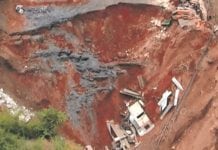
[miningmx.com] – AMID the din of debate about President Jaocb Zuma’s
plans for economic nationalism and increased state intervention, Minister of Mines
Susan Shabangu and Minister of Economic Development, Ebrahim Patel, are pushing
an interesting pro-business line that acknowledges the private sector’s role in job
creation. It’s a subtle but significant step, and organised business has pricked up its
ears. But, the jury is out as to whether Government is really about to embark on a
game-changing path of action.
Shabangu has first-hand experience about where poor Government policy and suspect
politics get you. After overseeing a sector that struggled to capitalise on two
commodity booms and experienced significant disinvestment, she’s adamant that
there’s only one way to re-industrialise and create jobs.
Government, she said on the sides of the recent Mining Indaba in Cape Town, has to
provide an enabling environment that allows businesses to be more competitive. Her
strategy aims to tackle what she calls “binding constraints’ on business. She and her
new Director-General, Thibedi Ramontja, have promised to review legal and
bureaucratic red tape, create policy certainty and “influence’ Cabinet so that its
infrastructure investment plan allows mining companies to grow and prosper. This
includes securing a more cost-effective energy supply and making smart decisions on
mining taxes.
Commenting on the tax proposals from an ANC task team looking into mine
nationalisation, Shabangu says: “Any tax regime must ensure that we are competitive
and attract investment. Reports proposing tax rises don’t mean this is a view that will
be adopted.’
Patel echoes this, saying that Government’s plan to ramp up infrastructure, especially
energy, transport, water, road, rail and communications, is a “platform on which
business can grow’. While he’s also taking a tough line on businesses that collude to
milk Government unnecessarily, he says Government is starting to hold up its side of
the bargain.
The decision to reduce port charges for exports by R1bn, says Patel, is an “important
signal’ about Government’s commitment to removing infrastructural “bottlenecks’ that
make doing business prohibitive.
Patel is forthright about how an inefficient, unskilled, under-funded and often corrupt
state bureaucracy is a key obstacle to growth. While Cabinet is hatching ambitious
plans to clean up the state system, equip it better and monitor its performance more
carefully, Patel is looking to partnerships with private companies to help implement
and pay for the R1 trillion infrastructure drive.
The reality for South Africa, says Deputy CEO of Business Unity South Africa (Busa),
Raymond Parsons, is that the economic space it has to manoeuvre is becoming very
tight. South Africa has declined in terms of its relative competitiveness, while its
ranking in terms of the “ease of doing business’ has dropped. As a result, South
Africa is expected to be a laggard among developing economies in 2012, many of
which are now enjoying an extended period of catch-up growth. Government has to
make smarter choices.
“We need to do much more to make life easier for small and medium-sized
business,’ says Parsons.
TOUGH QUESTIONS
Executive Director of the Centre for Development and Enterprise, Ann Bernstein, says
there are some “very tough’ questions that Government still has to answer before its
pro-business act becomes convincing.
For a start, she says, it would be telling to find out if Government consulted with
business leaders before choosing the five priority infrastructure projects announced in
Zuma’s State of the Nation Address. These include the Limpopo Waterberg rail and
road expansion; the Mpumalanga coalfields rail expansion; the Durban-Gauteng
freight corridor; the manganese export channel through Coega as well as the iron-ore
export channel to Saldanha. And what role, asks Bernstein, is envisaged for private
enterprise in implementing these plans?
Bernstein also points out that, while some ministers talk a new pro-investment line,
others like Minister of Public Enterprises, Malusi Gigaba, are pushing for state-owned
enterprises to be expanded and run under one department (his) so that Government
can correct what he calls “market failures’.
His vision certainly doesn’t take into account how poor the performance of these
enterprises has been and how seriously hindered they are by inadequate skills,
funding and purpose. Gigaba also fails to really understand the Chinese model that
inspires him. Contrary to popular belief, China has increasingly liberalised its
economy for the last three decades. Private business to GDP in the Eighties was in
the single digits, yet its contribution to GDP now stands at about 70% of output.
Ironically, a day after Gigaba participated in parliament’s State of the Nation debate
espousing the value of state-led investment, SAA asked for a cash injection of R4bn
to R6bn.
Political analyst JP Landman says that while Government’s infrastructure drive is a
“big deal’, the most critical question is whether the money used to implement the
plan will be spent efficiently.
The findings of Zuma’s SOE review commission will cast interesting light on
Government’s thinking about improving implementation and spending. There’s some
speculation that the commission will propose a more radical line, which includes
(private) strategic equity partners for some of the 312 public enterprises. This could
be a game-changer. But, steps towards realising a more competitive economy are
more likely to be incremental than dramatic.








